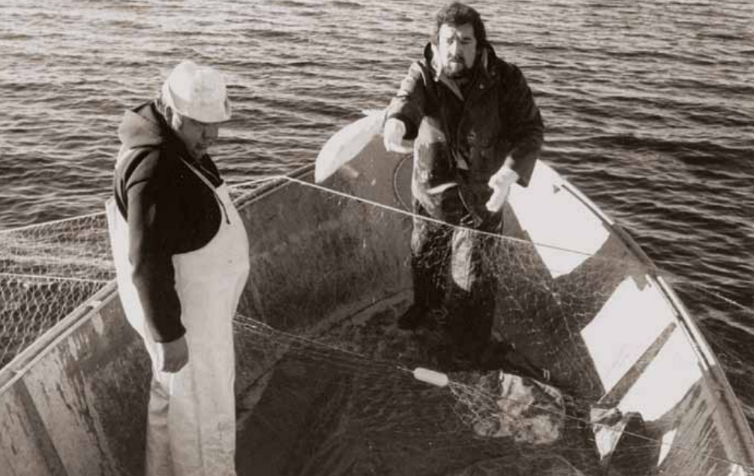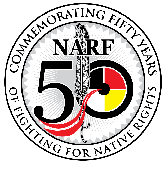
- Details
- By Neely Bardwell
The Native American Rights Fund (NARF) is celebrating its 50th anniversary with a gala in Denver tonight. NARF, the leading Native American legal defense organization across Indian Country, was actually established in 1970 but is celebrating its 50th anniversary two years late because COVID-19 pandemic restrictions prevented in-person gatherings two years ago.
The gala, Honoring Our Past, Protecting Our Future is a sold-out event that will attract 300 guests that includes tribal leaders, legal scholars, and other dignitaries. The gala will have live entertainment, and live and silent auctions, all while reviewing the history of NARF, the work the organization has done, and the accomplishments to protect tribal sovereignty and Native American rights that followed.
As part of the celebration, NARF created an 80-page anniversary book that reflects back on what they’ve done, where they’ve been, and how far they’ve come. 
The book starts with a brief letter from John E. Echohawk (Pawnee), executive director and co-founder of NARF. In his letter he speaks to the progress that NARF has made over the past 50 years:
“Native American social and economic conditions have been substantially improved in the last 50 years. Our legal representation and advocacy on behalf of Indian tribes, organizations, and individuals during that time has contributed to this success and has changed the history of Native Americans and the history of the United States.”
He goes on to thank those who have made this possible, saying “The 50 years of successful perseverance by the Native American Rights Fund would not have been possible without the great staff, wise board leadership, courageous Native American clients, and generous donors to our nonprofit cause.”
The Shakopee Mdewakanton Sioux Community is the gala’s proud presenting sponsor; the Yocha Dehe Wintun Nation is the stage Aponsor. Although tickets to the Gala have since sold out, you can still support NARF by donating here.
On Friday, Native News Online’s publisher and editor, Levi Rickert, interviewed John Echohawk. During the Q&A session, Echohawk spoke about the details about NARF and what specifically the organization does.
This interview has been edited for brevity and clarity.
Tell us about NARF.
It's all about providing legal representation to our tribes and Native organizations and individuals. Particularly where they're not able to afford lawyers. We're a nonprofit organization, raising funds to provide this legal representation and that's what we've been doing for 52 years. But still, there's still a lot of need for our legal representation and the requests for assistance just keep rolling in. We manage as many as we can, but there's no way we can help everybody.
This, unfortunately, is the reality many organizations with the purpose of serving Indian Country face. However, NARF has made tremendous progress since the organization’s conception.
We started in 1970. That was the same year that the federal government's policy changed. Under President Nixon, we repudiated the termination and assimilation policy that had been in effect for many years and supported the new self-determination era where tribes and their treaties were to be respected, and we were able to live the way that we wanted. We had a big need for legal representation to implement that, so we had started with grants from the Ford Foundation. They funded the NAACP Legal Defense Fund, the Mexican American Legal Defense Fund, so they finally started funding a Native American Legal Defense Fund–us–and we got involved in a number of important issues right away. We got the attention of other funding sources, and we grew pretty fast.
How many lawyers do you have currently?
The Native American Rights Fund now has 23 attorneys on staff with 15 of them working in NARF’s central office in Colorado. They also have three lawyers in Washington D.C. and five in Anchorage, Alaska. He explains that their funding comes from anywhere they can.
What do you consider to be NARF’s biggest achievements in its history?
I always think back to when we started. There was a real need for representation for the tribes up in Western Washington who were asserting treaty fishing rights. Fishing is what those tribes are all about up there. The State of Washington did not respect the treaties and were requiring them to get the fishing licenses and fish under state law. The 1855 treaties said that the tribes were going to share the resource in common with the citizens in the state. What that meant was 50-50 and the tribes fishing under Tribal Law. And that's what the courts held starting with a judge’s vote on the Ninth Circuit Court of Appeals and then eventually on the U.S. Supreme Court. So a big treaty victory once again showing that these treaties are the supreme law of the land. They're not ancient history.
We also got involved in representing the Menominee Nation that was terminated in the 1950s. Of course, the Congress said that was going to be good for them, and of course, it was really disastrous for them. So, we helped them explain that to Congress and Congress passed a law restoring their tribal status and other tribes that had been terminated followed by getting restored as well.
Tell us about NARF’s involvement with Native American voting rights.
NARF is no stranger to voting rights advocacy. In 2013 when the U.S. Supreme Court decided on a case that gutted many of the voter safety nets in the National Voting Rights Act, NARF picked up the fight by suing states over discriminatory voting laws.
We have all kinds of fights going on. Now, several cases dealing with redistricting because some of these states are, again, passing discriminatory laws that basically gerrymander things. Such that it dilutes the native vote and makes it difficult for our people to collect anybody who supports Indians. So we got all these issues together and put them in a proposed Native American Voting Rights Act, and we've been trying to get that passed in Congress as part of this push, nationally, to get the Voting Rights Act.
Would it help if our readers would write to members of Congress to urge them to support this legislation?
Yeah, that would help. It's just an ongoing issue, and of course, the politics of the Congress. It's kind of deadlocked between the Democrats and Republicans. This makes it difficult to get anything through, but we haven't given up. The civil rights community hasn’t given up, so we keep asking the Congress to pass the Voting Rights Act, including the Native American Voting Rights Act, and we just hope for the best. We never give up.
In July 2020, the U.S. Supreme Court ruled in the McGirt case that a large portion of eastern Oklahoma has never left tribal control. The State of Oklahoma has been pushing back on this decision. What do you think the battle is and where are we on McGirt?
The State of Oklahoma keeps asking the U.S. Supreme Court to reverse that decision that they made in McGirt, but they're not really getting anywhere on that. There is one issue pending right now that comes out of that McGirt case. The argument by the by the State of Oklahoma then we start exclusive jurisdiction over these grants involving Indians, by exclusive jurisdiction of the federal government and the tribal governments that there's concurrent jurisdiction in the state. So even though the federal government and tribes have jurisdiction, the states have concurrent jurisdiction. That's their current argument.
The US Supreme Court is hearing that this term so we shall see how that turns out. I don't think the state of Oklahoma is going to prevail, but they keep trying everything to get around McGirt.
More Stories Like This
Native News Weekly (August 25, 2024): D.C. BriefsUS Presidents in Their Own Words Concerning American Indians
2026 Native American 40 Under 40 Class Announced
Monday Morning: (January 5, 2026): Articles You May Have Missed This Past Weekend
Native News Weekly (January 4, 2026): D.C. Briefs
Help us defend tribal sovereignty.
At Native News Online, our mission is rooted in telling the stories that strengthen sovereignty and uplift Indigenous voices — not just at year’s end, but every single day.
Because of your generosity last year, we were able to keep our reporters on the ground in tribal communities, at national gatherings and in the halls of Congress — covering the issues that matter most to Indian Country: sovereignty, culture, education, health and economic opportunity.
That support sustained us through a tough year in 2025. Now, as we look to the year ahead, we need your help right now to ensure warrior journalism remains strong — reporting that defends tribal sovereignty, amplifies Native truth, and holds power accountable.
 The stakes couldn't be higher. Your support keeps Native voices heard, Native stories told and Native sovereignty defended.
The stakes couldn't be higher. Your support keeps Native voices heard, Native stories told and Native sovereignty defended.
Stand with Warrior Journalism today.
Levi Rickert (Potawatomi), Editor & Publisher


